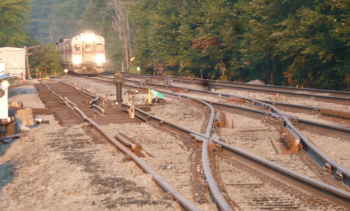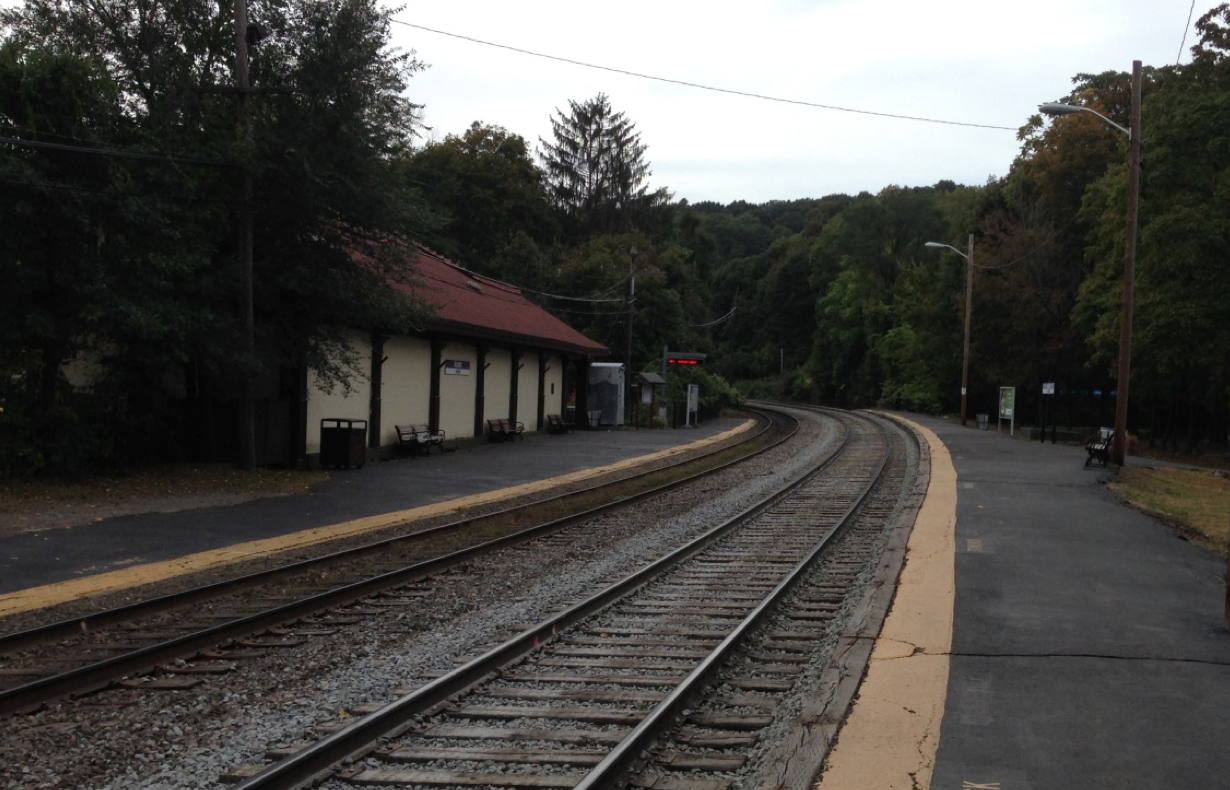Photo: A corner in Belmont being modify to allow commuter rail trains to travel up to 50 mph on the curve.
There will be a pair of noisy weekends in June and one weekend that month which a major Belmont road will be closed, but according to representatives from the Massachusetts Bay Transportation Authority, the final bit of heavy construction on the commuter line in Belmont will be completed by the time the 4th of July comes around.
“We should have the cross-over rails installed as well as new signals at Brighton Road by the end of June,” Joe Nolan, a MBTA consultant told the Belmontonian after a presentation the authority made to the Belmont Board of Selectmen on Wednesday, April 8 to update the public and board on the status of the three-year Fitchburg Commuter Rail Line Improvement Project that runs through Belmont.
With the completion of this major work, “the only work needed will be making sure the new systems are performing as expected,” said Nolan.
But it will be two weekends – including night work – in June in which residents along Channing Road and surrounding streets will be subject to lights, traffic and noise associated with the laying of cross-over tracks, which guides commuter trains from one track to another.

In addition, the installation of modern signaling at the Brighton Road crossing will require that road near the intersection with Hittinger Street to be closed for a weekend also in June, said Eric Fleming, the MBTA’s project oversight manager.
When the final dates for the work are scheduled, the abutters and the town will receive either a flier or an email notice on the time and date of the overnight work.
The project is scheduled to be completed by the end of 2015. Until then, weekend service on the line will be suspended beginning on April 25 and running through Nov 22.
The $306 million project, which is financed by federal transportation grants, is expected to increase performance and lower travel times from Boston’s North Station to Fitchburg by installing new tracks and curb modifications to trains so they can travel up to 80 mph in certain areas of the route. There is also new and improved infrastructure such as new bridges and stations, parking garages and warning signals.
When told that trains will be traveling as fast as 80 mph in Belmont (when the tracks enter Belmont at the Cambridge line), Selectman Mark Paolillo asked if the Board could request those speeds be lower to the current 60 mph limit.
Nolan said that since the trains will likely be stopping at Belmont Station (in Belmont Center), the speed will be coming down rapidly as it approaches the station. In addition, even if an express train comes through the same station, it will be limited to 50 mph since it is on a curve.
He also told the board that allowing trains to run faster “was the objective of the MBTA” when accepting the project.
Paolillo said the new top-end speed is troublesome since generations of school children and some adults illegally trespass onto the tracks from the Winn Brook neighborhood to reach Belmont High School.
Fleming said such behavior by mostly young residents was something the town “can’t turn a blind eye to” pointing to the lack of enforcement to prevent the activity from occurring. He noted the MBTA has programs to inform the public of the dangers of walking along active rail tracks and would be willing to come to the High School with a presentation.
While Paolillo asked if funding could be secured to assist in the building of a tunnel or overpass in the area, Nolan said no designs or money was set aside in the project for such a use.
When told the best approach would request the funds from the legislature, Paolillo said the town should “accelerate” talks with State Sen. Will Brownsberger and State Rep. Dave Rogers on relaying the need for a permanent solution.
While several Channing Road residents told the board and the MBTA that construction-related “vibrations” had resulted in structural damage to their homes, Fleming said the type of work in Belmont was akin to “replacing a water main” and not the jack-hammering associated with construction of roadways.








Leave a Review or Comment